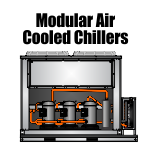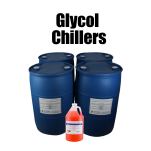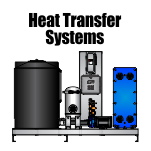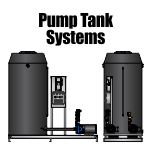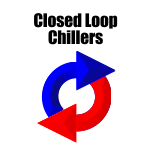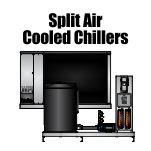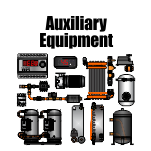Chiller Applications
Whaley Products, Incorporated manufactures chiller systems including water and air cooled chillers. We supply chilling systems and chillers to a wide variety of industrial processes and production machinery applications, ranging from self-contained portable units through to completely installed “turn-key systems”. A chiller can be used to cool any machine or process that operates at 70 F or lower. A cooling tower can be used to cool any machine or process that operates at 85 F or higher. WPI’s chillers and cooling tower systems serve the following applications:
[click any of the links below to open]
Plastics
In the plastics industry, a chilling system cools the hot plastic that is injected, blown, extruded or stamped. A chilling system can also cool down the equipment that is used to create plastic products (hydraulics of the molding machine, gear box and barrel of the extruder that saves on energy and on the wear and tear of the machine itself. Because expansion is inevitable in the plastics industry, our modular chillers allow processors to bring in a new module that can installed within a matter of hours. If you have an industrial process where expansion is inevitable but difficult to anticipate or calculate, a modular chilling system could be the perfect solution.
Injection Molding
In addition to removing the heat from the plastic mold, our chillers can be used to transfer heat away from the hydraulic heat exchanger, the mold temperature controller (thermolator) and the feed throat of the injection molding machine. While there are other heat removal devices such as a cooling tower, well or city water, using our chillers offers you some distinct advantages.
Printing
In the printing industry, a chiller not only removes the heat generated by the friction of the printing rollers, but cools down the paper after it comes out of the ink drying ovens in the process.
Laser
In the laser cutting industry, light projection industry, etc. a chilling system is used to cool down the lasers and power supplies.
Rubber
In the rubber industry to cool the multizone water temperature control units of the rubber extruder barrel, cool the rubber mill, calendars and bambury mixers.
Beverage
In the beverage industry, a chiller removes the heat gained from the process during mixing, cooking, or after pasteurizing the product.
Air Conditioning
With cooling expenses accounting for 30% to 50% of your total energy costs and rising fast, and the impending phaseout of chlorofluorocarbon (CFC) and hydrochlorofluorocarbon (HCFC) refrigerants, there is a rapidly growing need to replace large commercial air conditioning and refrigeration systems. To meet this demand, we offer hvac, air conditioning or modular chillers for large industrial and commercial applications. Our systems are easy to replace or maintain and have a service life of 10 to 20 years giving you long term, low cost energy efficiency.
MRI
Magnetic resonance imaging (MRI) is a method of creating images of organs inside of the human body. In the medical profession these devices are often used to distinquish pathological tissue, i.e., a brain tumour, from normal tissue. MRI chillers are used to remove the heat from the MRI scanner and transfer it to ether the surrounding ambient air or a water source such as a cooling tower.
Anodizing
Because anodizing process generates a lot of heat, cooling is a must, particularly for hard coating processes. Chillers will do most of the work, removing process heat using either an air or water cooled chiller. Air cooled units are generally installed outside, and eliminate the need for a tower. Water-cooled units are the most efficient method, particularly in warmer climates. They are installed inside a building with a cooling tower oustide.







